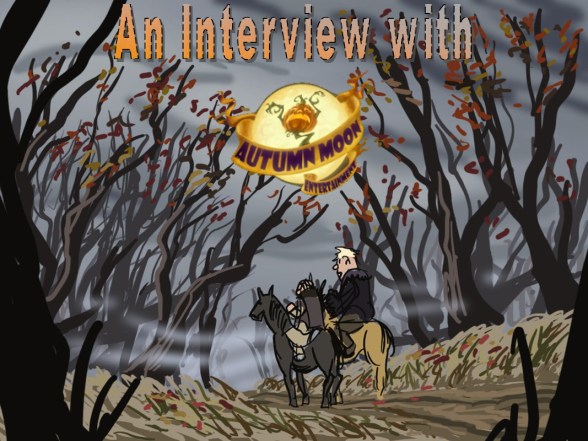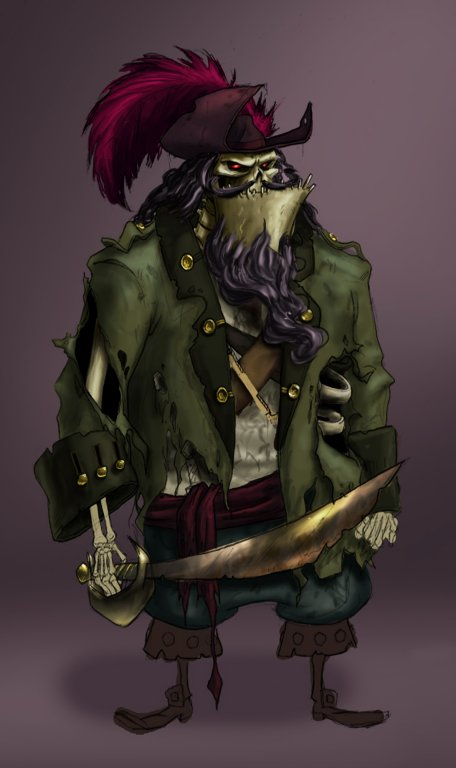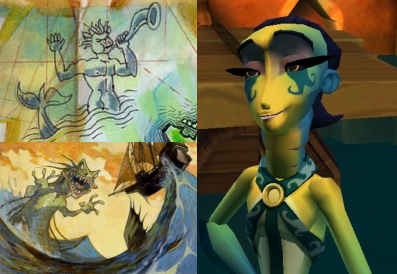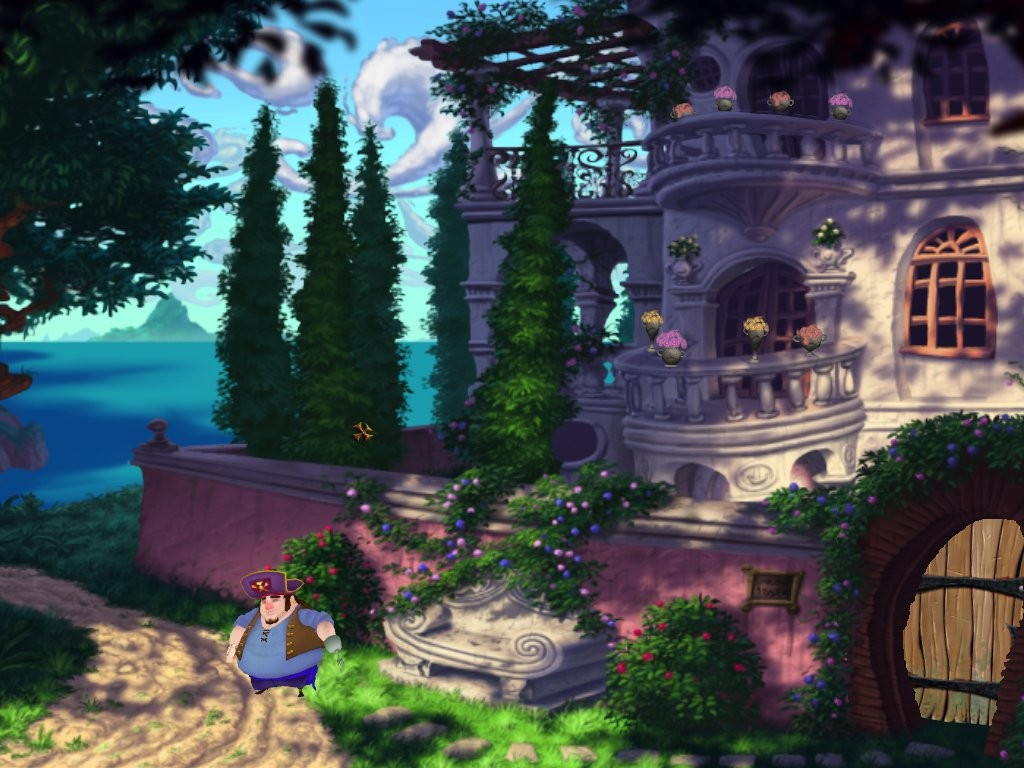Articles

Bill Tiller at Autumn Moon Entertainment, 2010 Ghost Pirate origins
With their latest game, Ghost Pirates of Vooju Island, recently released in Germany and imminently for the rest of the world, we thought it would be a good time to catch up with the lately low-key Autumn Moon Entertainment.
While folks like Telltale re-invent the delivery and production paradigm of story games and others like Double Fine and Crackpot look to evolve the genre with different types of gameplay, Autumn Moon's first titles indicate a more strictly old-fashioned aim than the other ex-LEC studios, favoring pure, point 'n click graphic adventures complete with illustrated backgrounds, endeavoring to capture not only the spirit, but the style and even production values of the LucasArts classics while struggling with the budget limitations those games didn't have.
We chat with CEO Bill Tiller about the not inconsiderable hardships and joys of being a graphic adventure studio, reflections on the development of A Vampyre Story and Ghost Pirates, and the status of A Vampyre Story 2: A Bat's Tale, all in the most epic Q&A since... well, look, isn't it enough of an occasion that Mojo even still manages to score an interview these days?
Autumn Moon’s second title, Ghost Pirates of Vooju Island, was released in Germany this past fall. Do you have any quick thoughts on the game being out the door?
Well I am glad it is finally finished, and I was thrilled DTP asked us to make a Curse of Monkey Island inspired pirate game, but like all projects I wish we had a few months more to work on it, to give it that final polish. Same thing happened when I was on Curse of Monkey Island. We wanted another few months to get the final cut scene done, a big dance number on the yard arms of a pirate ship. Unfortunately, we ran out of time. But that is the reality of the game business, a reality I am still struggling with a bit. George Lucas once said to Spielberg “You have a 10 million dollar budget but 100 million dollar imagination.” My vision for my games often exceeds my budget. I love Ghost Pirates a lot and had fun making it, but it would have been nice to polish it more than we could. But those are the economic realities of the adventure game market currently. We have been rethinking how we do production for future games so that we can have the polish time we need to make the game perfect. Having said that, there is still a lot I like about the game. I think my love of the pirate genre really shows up as well as my love of the characters. I don’t know what it is about working on a pirate game that gets my creative and adventurous side all fired up. I think that comes through in the game, and I am happy that we achieved that. I am looking forward to working on Ghost Pirates 2 if that ever gets green lit and funded.

Ghost Pirates was originally slated for an early 2010 release. How were you guys able to get the game out ahead of schedule?
We were always going to get the game done in 2009 with plenty of time to spare. DTP, our publisher, decides when the game is released. I am not sure why they moved the release date up. There are a lot of factors that go into deciding when it’s best to release a game, not all of which I am privy to.
When did Ghost Pirates production begin in relation to AVS1 wrapping?
We signed Ghost Pirates in January 2008, and started on it a month later, in February. We were working on both games from February to November. Working on two games was an interesting challenge, and we were able to do it, but I think it would be best in the future to work on only one game at a time, unless we got significant investment money. Under those circumstances, I think it would work a lot better and dual productions would go smoother.
Ghost Pirates was published by DTP entertainment. What made them the ideal partner for this game?
I wanted to work on another pirate game, be it Monkey Island or an original story. I was bummed to hear the president of Lucas Arts at the time say they weren’t going to make any new Monkey Island games for something like five to seven years. So there went any chance of ever working on a Monkey Island game anytime soon. I was pretty bummed along with a lot of other MI fans.
Then, in typical Tiller fashion, I said “Heck with it. I’ll make my own pirate game. And this will be fun because I have creative freedom to do what I want with it. I can make my own characters and story and locations and mythology and back story, etc.” I remember working on Curse of Monkey Island and suggesting we have a mermaid in the game, and Larry Ahern and Jonathan Ackley saying that was too fantastic for MI. So with my own pirate game I could add all the fantasy elements I wanted and not have to worry about what the other Monkey Island games did. So I was bummed not to be doing MI but it was also creatively liberating.
I wrote up a brief proposal and did some rough concept art for it, I had a meeting with the AVS team to brain storm some ideas for the game. When DTP contacted us to make a game for them, I pitched them three games: Ghost Pirates, a spinoff of a Vampyre Story, and a sci-fi game. They felt that fans of MI might enjoy a pirate game from me since it might be a while before Lucas Arts got around to making a new MI game. They chose to do Ghost Pirates. That’s how it came together. This was in the summer of 2007.
When Ghost Pirates was announced, adventure fans were excited to finally get another high quality pirate adventure game. Months later, adventure gamers were surprised again to see a new Monkey Island announced. Do you have any thoughts as to why adventures are suddenly becoming seemingly viable again after such a long drought?
Well I don’t know if they are viable or not. I hope they are. For us they haven’t been - yet. So this whole thing is kind of an experiment for us to see if they are. For us, the jury is still out on that. But they may be.
I think that adventure games were an area Lucas Arts ignored for eight years and now they realize there is a market for them, but how big is that market and how big should the budgets be? If we spend ten million on an adventure game will the quality be so great that people will have to buy it? Or should we try and do this game for 700k and hope to make a profit in two years after steady sales? Another question is should they be sold episodically for $10 and spend 250k per episodes, then package them all up as one big game? Those are the strategies we are all exploring to make adventure games a viable business. I hope they are because I enjoy many aspects of making them.

Though Autumn Moon is headquartered in Petaluma, so far all of the publishers you’ve been associated with have been based in Germany. Why is it that European publishers seem to have more faith in adventure games than those stateside? Do you think this is something that could one day change?
Adventure games seem to sell well there. European publishers see that and want to get in on it. Ron Gilbert told me once about U.S. publishers, “Main stream publishers are only interested in safe home runs, not doubles or singles.” U.S. publishers tend to want to make one 20 million dollar game based on an established property or endless sequels to previously successful games, instead of making twenty 1 million dollar games based on original ideas. I think you can win both ways. That said, if a publisher had a huge hit with an adventure game, American publishers would sit up and take notice and then jump in on that action. The industry is very much like that. Imagine you had ten million dollars and you had to fund a game. Would you put that money into Modern Warfare 3 or several adventure games? Most publishers (and investors) go for the Modern Warfare. I think a publisher would have to enjoy creating an adventure game and see value in making a variety of types of games to invest more in adventure games.
And to the question of whether or not the status of adventure games in Germany is changing, I don’t see it changing anytime soon, but you never know. I’m just not that familiar with the German PC game consumer, unfortunately.
The announcement of Ghost Pirates seemed to come out of nowhere. How did landing a publisher for that game compare with finding one for A Vampyre Story, a process which took several years?
During the hunt for a publisher for AVS we luckily got interest from many publishers, DTP being one of them. They wanted to see what other games we had to pitch besides A Vampyre Story. Since we had three proposals ready to go, it was fairly easy.
Tell us a little about the Ghost Pirates team. Is it largely the same crew as AVS? Has the company seen any significant expansion?
Yes and no. We went through a number of team members from AVS1 to Ghost Pirates. We had a new writer and a new lead animator, and a new programming and scripting team. It was not intended, just a slow gradual change. I think the biggest change was in the writing. We felt we needed an in house writer and scripter instead of outsourcing the work, that way we could kill two birds with one stone. So we hired a game designer, Gene Mocsy from EA to do our writing, scripting and to help produce our outsourced animation production. He wore three very important hats! He helped a bit on AVS 1 writing and then handled the entire in game dialog. In the beginning we had a lot of the same crew on GP as had worked on AVS. Over time, some left to pursue other projects and we reorganized the production to get the budget slimmed down. We are always trying new production strategies to try and keep the game on target as much as possible. We have to reshuffle the line up in areas from time to time, or replace people if they’re not working out. With such a small budget, it’s tough to keep people on the payroll if they don’t fit perfectly into a position. On bigger projects sometimes you can get away without having a perfect team, but with small budgets it’s not so easy. On Ghost Pirates we had a really good team that were very talented and super hard workers. I was very happy with that team.
Do you have a favorite scene, character or puzzle from Ghost Pirates?
I really like all the characters, so I can’t pick a favorite. I like the coconut plantation puzzle with Papa Doc, the charades mini game with Blue Belly, and the ballroom puzzle with Jane Starling and Grimjaw. I’d say I like almost all the scenes because when I came up with them I just kept thinking, “What would be a fun scenario, a cool location that would be fun, and have an adventurous feel?” For me, all the scenes feel pretty fun, and I hope the players and critics will agree.

Both AVS and Ghost Pirates star heroes who are forced to adapt to challenging and bizarre personal circumstances beyond their control – being undead. Although it makes for prime fodder for humor, it results in some serious moments as well. Is it fair to say that making your stories highly character-driven is a trademark you feel strongly about?
Yes, absolutely! I think of adventure games as interactive animated movies, so the number one thing that drives the story is the characters. The challenge is getting the personalities and motivations of the characters to come across well in the game. True, many of my characters have problems to overcome; I just use curses and magic as a fun analogy for stuff that happens to us in real life. I find the ways we overcome adversity very interesting. Maybe that is why I have been making my own life so difficult lately! :) Having been trained to tell stories in the Disney animated (now Pixar) style, I like the mixture of comedy, adventure and drama. 101 Dalmatians and The Incredibles, are perfect examples of the kind of stories I like to tell, adventures about characters we can sympathize with.
Like AVS, Ghost Pirates looks to have gorgeous artwork. How does an independent graphic adventure developer achieve a balance between high production values and, well, the reality of adventure game budgets?
We don’t! At least I can’t anyway. Maybe somebody out there can. I still don’t think I got the balance right yet. In AVS, we emphasized a lot on animation quality and background art. But we skimped on engine programming, thorough testing, and scripting to make up for the cost of focusing on art. We got slammed pretty badly on the writing and programming. So on Ghost Pirates we focused more on the scripting and tech side, and improved the writing. But that didn’t leave us with the time or the budget to perfect the special effects and the FMV animation, and it shows. So far I haven’t been able to balance them all correctly. It is extremely challenging on a small budget to get the quality, the time schedule, and the costs to all work out perfectly. With larger funding, you can often get two out of those three correct (hopefully one of those is quality). I am hoping the next game I do will have the right balance.
Set course for page two to find a morsel about AVS2 as well some timber-shivering Ghost Pirates backstory that didn't make it into the final game.